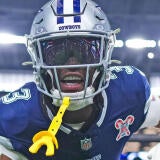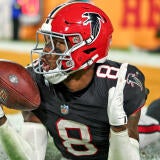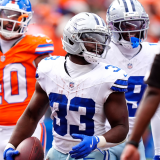2019 Fantasy Football Draft Prep: Running Back Tiers 3.0 and strategy
How should you go about drafting running backs? Early and often, Dave Richard says, in his breakdown of the state of the position.
As a position group, running backs matter. They've always mattered. They're huge components of Fantasy in that they're highly productive thanks to their workloads, they're the best trade currency out there and there are enough good ones to go around.
That means Fantasy owners have plenty of strategies when it comes to drafting them, and your league's scoring system will play a huge role in what strategy you go with.
Once you know your lineup requirements and scoring system, you can answer these questions:
- Are you willing to take risks?
- Does running back injury history matter to you?
- Do you believe in handcuffing non-elite running backs?
- Do you enjoy being active on waivers?
The first two questions are meant to help you determine how deep the running back talent pool is for you. The more chances you're willing to take and the more injuries you're willing to overlook, the more running backs you'll happily put in your starting lineup.
The second two questions are designed to get an idea of how you should attack your running back depth. There are plenty of cases where getting the real-life backup to one of your ball carriers is wise. And if you're lazy about waivers, you might prefer to build serious running back depth on Draft Day.
Because of the depth at receiver and the lack of "safe" running backs once you're through Round 4, it's probably in your best interests to lean toward grabbing reception-heavy running backs early and often. That's a breeze in Round 1, especially if you're picking in the top-4. Round 2 doesn't offer quite as much, but there will be a run in Round 3. As you'll see, there are enough running backs to propel you through Round 3 unless you rule out some based on injury concern (Todd Gurley, Devonta Freeman) or a lack of experience (Damien Williams, Josh Jacobs). The more running backs you refuse to draft, the more certain it is you'll force yourself to fill up on the position in Rounds 1 and 2.
In non-PPR, expect most people to begin taking one running back and one wide receiver/tight end to kick off their teams. If running backs mean anything to you at all, taking three within the first five rounds -- and two in the first four -- should set you up nicely for a well-built roster:
Non-PPR Running Back Tiers
ELITE | NEAR-ELITE |
ROUND 1 | ROUND 2 |
Ezekiel Elliott | Le'Veon Bell |
Saquon Barkley | Joe Mixon |
Alvin Kamara | Nick Chubb |
Christian McCaffrey | Damien Williams |
James Conner | Leonard Fournette |
David Johnson | Kerryon Johnson |
| |
HIGH-RISK HIGH-REWARD | VERY GOOD |
ROUND 3 | ROUND 4 |
Dalvin Cook | Melvin Gordon |
Josh Jacobs | Chris Carson |
Aaron Jones | Phillip Lindsay |
Marlon Mack | Devonta Freeman |
Todd Gurley | Sony Michel |
Derrick Henry | Mark Ingram |
| |
NO. 3 RBs/HIGH UPSIDE | NO. 3 RBs/LESS UPSIDE |
ROUND 5 | ROUNDS 6-7 |
David Montgomery | Tarik Cohen |
Tevin Coleman | James White |
Kenyan Drake | Lamar Miller |
Austin Ekeler | |
Darrell Henderson | |
Rashaad Penny | |
Latavius Murray | |
Miles Sanders | |
HIGH-POTENTIAL BACKUPS | MID-POTENTIAL BACKUPS |
ROUNDS 8-9 | ROUND 10 |
Jordan Howard | Devin Singletary |
Peyton Barber | LeSean McCoy |
Ronald Jones | Alexander Mattison |
Derrius Guice | Darwin Thompson |
Royce Freeman | Carlos Hyde |
Kalen Ballage | |
D'Onta Foreman | |
Justin Jackson | |
Ito Smith | |
Damien Harris | |
Jaylen Samuels | |
| |
BENCH DEPTH | |
ROUND 11+ | |
Justice Hill | Jamaal Williams |
Matt Breida | Malcolm Brown |
C.J. Anderson | Ryquell Armstead |
Adrian Peterson | Mike Davis |
Jerick McKinnon | Tony Pollard |
Duke Johnson | Benny Snell |
Kareem Hunt | Darius Jackson |
Dion Lewis | |
It's a different story in PPR, where wide receiver and tight end values rise with catches counting for something. Fantasy drafters will still chase running backs, but there's a little less pressure because there are enough of them who catch the ball and can accrue useful Fantasy points that way. I recommend going for three running backs through six rounds in PPR:
PPR Running Back Tiers
ELITE | NEAR-ELITE |
ROUND 1 | ROUND 2 |
Alvin Kamara | Le'Veon Bell |
Saquon Barkley | Joe Mixon |
Christian McCaffrey | Nick Chubb |
Ezekiel Elliott | Damien Williams |
David Johnson | Leonard Fournette |
James Conner | Kerryon Johnson |
| |
HIGH-RISK HIGH-REWARD | VERY GOOD |
ROUND 3 | ROUND 4 |
Dalvin Cook | Derrick Henry |
Josh Jacobs | Devonta Freeman |
Aaron Jones | Phillip Lindsay |
Todd Gurley | |
Marlon Mack | |
Melvin Gordon | |
NO. 3 RBs/HIGH UPSIDE | NO. 3 RBs/LESS UPSIDE |
ROUND 5 | ROUNDS 6-7 |
Chris Carson | Tarik Cohen |
Tevin Coleman | Sony Michel |
David Montgomery | Darrell Henderson |
Kenyan Drake | Lamar Miller |
Mark Ingram | Austin Ekeler |
James White | Rashaad Penny |
HIGH-POTENTIAL BACKUPS | MID-POTENTIAL BACKUPS |
ROUNDS 8-9 | ROUND 10 |
Latavius Murray | Devin Singletary |
Miles Sanders | Alexander Mattison |
Jordan Howard | Darwin Thompson |
Peyton Barber | LeSean McCoy |
Ronald Jones | |
Royce Freeman | |
Derrius Guice | |
D'Onta Foreman | |
Kalen Ballage | |
Justin Jackson | |
Ito Smith | |
Damien Harris | |
Jaylen Samuels | |
BENCH DEPTH | |
ROUND 11+ | |
Carlos Hyde | Adrian Peterson |
Justice Hill | Kareem Hunt |
Jerick McKinnon | Nyheim Hines |
Matt Breida | Chris Thompson |
Dion Lewis | Jamaal Williams |
Duke Johnson | Mike Davis |
C.J. Anderson | Jalen Richard |
Is Zero RB still a thing? It is, and it's not a bad way to go if you're picking late in Round 1/early in Round 2 in full PPR or are in a smaller league (10 or fewer teams). You could kick off a team with DeAndre Hopkins, Travis Kelce and Julian Edelman and still find Tier 3 running backs later on. This plan is a lot less appealing in non-PPR due to receptions becoming meaningless, and it's straight-up insanity to do it when there's an elite-tier running back staring you in the face, so rule it out if you have an early first-round pick.
The other key is to select unpopular backs who will at least start the season in a prominent role (Lamar Miller, Jordan Howard, maybe Peyton Barber). You'll squeeze points out of them before replacing them for whatever hotness comes to you off waivers. You must be willing to be active in finding running backs on waivers in order to skip running backs early.
Because running backs are so vital to Fantasy Football success, I still recommend getting a lot of them. If you have six bench spots, aim for at least five. Seven or eight bench spots, aim for six. Remember, each running back you take represents potential, even the ones who begin the season as backups. Never draft a running back you're not excited about, and never draft a running back who you'd probably drop after one or two dud games to begin the year. My favorite backs to be patient with can be found in Tier 6.















